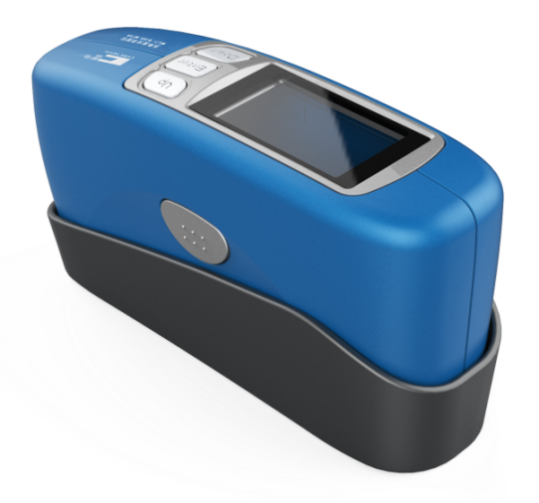Grant of $750,000 for professional laboratory equipment was awarded by the Massachusetts Life Sciences Center to prepare students for in-demand life sciences careers
With the snip of a ribbon, exciting new learning and career opportunities for UMass Dartmouth's Medical Laboratory Science (MLS) students became official. Electrophoresis

College of Nursing & Health Sciences (CNHS) faculty and staff and Provost Ramprasad Balasubramanian, joined by representatives of the Massachusetts Life Sciences Center (MLSC), led a ribbon-cutting appreciation celebration for the updated laboratory equipment awarded to the Department of Medical Laboratory Science that was funded by a $750,000 grant from the company.
Following the official opening, representatives of MLSC and the college community toured the MLS labs that were decorated with blue and gold bows so guests could easily see the range of equipment funded by the grant that spanned over three instructional laboratories. MLS students and faculty were on hand to demonstrate the new equipment and talk about the impact it is making on teaching and learning life sciences.
The "Stepping Stones: Achieving Greater Diversity in Life Sciences through Laboratory Science" grant stems from UMass Dartmouth and the Massachusetts Life Sciences Center's shared commitment to increasing diversity in the life sciences. The grant funding was announced in September 2022 and was used to upgrade technology and equipment in the MLS laboratories to include ADA-accessible biological safety cabinets (laminar flow hoods) and chemical fume hoods, immunohematology (blood banking) work stations, clinical chemistry blood test analyzers, an automated PCR instrument, and much more. The new equipment enables MLS students to learn on the same equipment with the same methodologies used in the state's laboratories and hospitals.
“This is an exciting opportunity to thank the MLSC leadership team for their grant funding that allowed us to truly, truly transform our instructional labs and ensure high quality educational experiences using the most up-to-date laboratory equipment. Our deepest gratitude to MLSC for making our instructional space dreams come true."
In a brief speaking program, CNHS Dean Kimberly Christopher welcomed and expressed gratitude on behalf of the college to MLSC representatives Ryan Mudawar, vice president of education and workforce programs; Jeanne LeClair, vice president of economic development and partnership; and Joseph Sullivan, senior advisor and vice president of marketing, communications, and community relations.
"This is an exciting opportunity to thank the MLSC leadership team for their grant funding that allowed us to truly, truly transform our instructional labs and ensure high quality educational experiences using the most up-to-date laboratory equipment," said Dean Christopher. "Up-to-date instructional labs lead to better prepared program graduates and a successful transition to the workforce.
"MLS students and faculty have shared with me that the new equipment has made a world of difference in the course experiences. In CNHS, investing in the student and faculty experience is a primary goal," she added. "Our deepest gratitude to MLSC for making our instructional space dreams come true."
In thanking all those on campus who made the grant possible, MLS Department Chair Frank Scarano said, "We are so, so grateful that we were able to have three-quarters of a million dollars infused into our equipment. I can’t even find the words to express our gratitude. Thank you so much."
"My general message is our students deserve the best, and that is the principle by which we operate," said Balasubramanian, who credited Dean Christopher and Scarano for their advocacy for upgraded lab equipment for their students. "Health science plays a critical role on the SouthCoast and in our community and this will really transform the training that we provide our students so they can hit the ground running and fulfill our mission to serve an important role in the commonwealth and the community."
MLSC was created 15 years ago to invest in and support the growth of the life sciences ecosystem throughout Massachusetts and has invested nearly $1 billion so far.
"We are super excited to support the growth of life sciences in MA," said Mudawar, who added that 42,000 new jobs are forecast for this industry in MA over the next 10 years. "We look forward to continuing to make these strategic investments to support the life sciences ecosystem. We need to invest in support programs like this that are going to train the future workforce."
The new lab equipment—which also includes 75 Olympus biological microscopes, three Olympus biological teaching microscopes, 20 Apple iPads, 4 interactive whiteboards and projectors, new laboratory furniture, workstations, and more—began arriving last fall and deliveries continued through the end of this summer. Sarah Frade, the MLS professional technician, ordered the equipment and oversaw all deliveries and installations.
Students began using the new equipment as soon as possible and it is now fully integrated into their courses. Those impacted the most by this infusion of new technology are the program's seniors, who first learned with the older equipment. Next semester, they will begin their clinical practica with experience using the newest technology.
In the MLS program, known as the "the science behind the medicine," students learn to analyze blood, body fluids, cells, tissues, and other specimens to determine the cause of diseases and their appropriate treatments.
The new equipment and upgrades "give us more opportunity to teach a variety of things," Scarano said. "This equipment is found in different industries and enables us to test a wider range of analytes. It provides students with a broader range of experiences and exposure before they graduate. With the new equipment we can replicate the most up-to-date techniques used in medical, clinical, and life science settings across the Commonwealth and beyond.
"Our seniors recognize and really appreciate the new equipment," Scarano added. "We now have the most modern technology. It’s like the difference between driving an old used sedan and a shiny new sports car with all the bells and whistles."
Assistant Teaching Professor David Cabral, who is a specialist in hematology, demonstrated one of the new teaching microscopes that links to an interactive whiteboard so an entire class can view more detailed images simultaneously. He calls the new teaching tools "revolutionary. We have to teach with images. We need to be able to see details and pattern recognition to determine whether cancer is present or not. The images are much sharper. It’s like night and day—a whole new world has opened up."
"It's just fabulous. I look forward to using it in parasitology," said Lecturer Patricia Jefferson in front of one of the new interactive whiteboards "Students will practice their microscopy skills individually on their own new microscopes, but when they struggle with subtle differences, I can project the slide on the screen to point out details for the whole class at once. I can also save images and send them to the students via Bluetooth. It makes learning faster and easier for all the students in the class."
Josh Cunha '24 said that the greatest change is in the microscopes that provide stronger contrasts in color and light for parasitology analysis. "It's made learning a lot easier. We’re able to quantify a lot more in a precise way. It's much more like what we’ll be using professionally. While the old equipment helped us learn methodologies, the new equipment helps us to better manage patient samples."
Trini Altschul '24 said that the new equipment enables students to save time and focus more on concepts for better training. "We're running different tests and learning to more accurately diagnose and treat patients," she said. "It’s what it would be like in a hospital lab. You have to know how to use the instruments and troubleshoot."
"Having the new technology has made such a difference," said Colin Soares '24. "We're more confident."
Soares, who plans to attend medical school, will be doing his practicum at Boston Children's Hospital where there are two Cobas instruments that analyze a range of chemical substances in the body and can determine if a patient is having a heart attack, for example, or help diagnose a variety of disease states. He has already learned to use the new Cobas analyzer in the MLS labs. "The MLS program is one of the best foundations for medical school. It’s much more based on human science. Going into it, I’ll be ahead. This is a fantastic program."
The Stepping Stones grant was part of the Baker-Polito Administration and the Massachusetts Life Sciences Center announcement of 39 grants totaling more than $14.6 million to create more career pathways for students in the growing life sciences fields. In addition to working in health care facilities, MLS students also pursue graduate school and careers in medicine, biotechnology, instrumentation, and research.
UMass Dartmouth's Medical Laboratory Science Program, one of the largest in the nation, has enjoyed success with a 100% graduation and employment rate for MLS majors. The average 3-year pass rate on the ASCP exam for MLS professionals is 97%. The program is accredited by the National Accrediting Agency for Clinical Laboratory Science, which makes students eligible for national certification from the American Society for Clinical Pathology.
“This is an exciting opportunity to thank the MLSC leadership team for their grant funding that allowed us to truly, truly transform our instructional labs and ensure high quality educational experiences using the most up-to-date laboratory equipment. Our deepest gratitude to MLSC for making our instructional space dreams come true."
Pursue your degree in medical laboratory science. Our medical laboratory science program is accredited by the National Accrediting Agency for Clinical Laboratory Sciences.
myUMassD is our web portal, a central location for email, notifications, services, and COIN: Corsairs Online Information.
Visit us from anywhere, at any time. Take a virtual tour of the UMass Dartmouth campus.

Rotary Evaporator © 2024 Board of Trustees of the University of Massachusetts